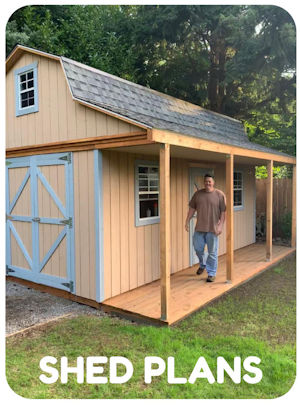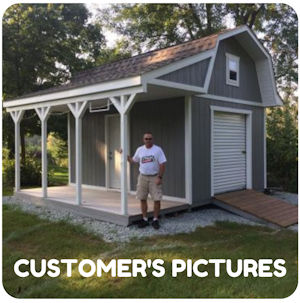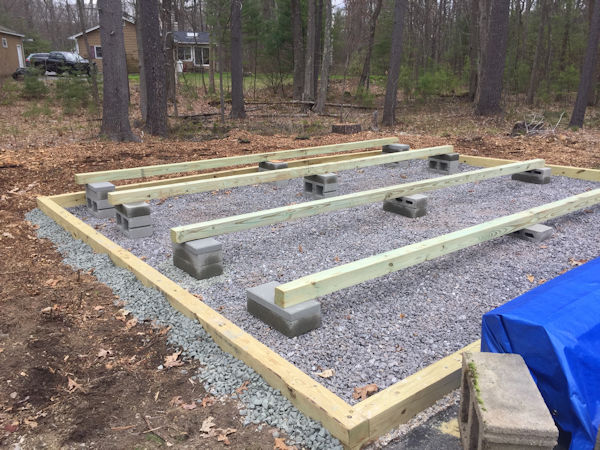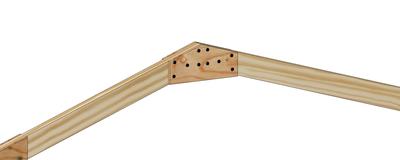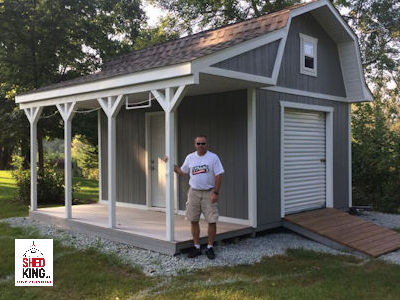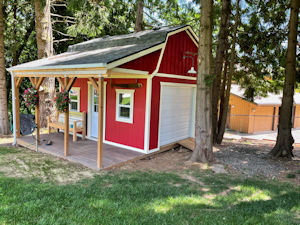Want to Save 30% off Any Shed Plan Purchase!
Signup For My 'Shed n Sight' Newsletter
and Get Your 30% off Promo Code To Use At Checkout.
- Home
- Proper Shed Building Tips
- How to heat your shed
How to heat a shed: safe ways with and without electricity
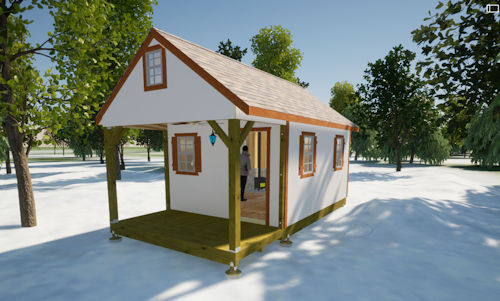 How To Heat a Shed In The Cold Winter Months
How To Heat a Shed In The Cold Winter MonthsAs someone who spends a lot of time in my shed, I know the importance of keeping it warm during the winter months. Whether you're using your shed as a man cave, a home office, or a workshop, finding the right heating option is essential to making the most of your space. In this guide, we'll take a look at the best heating options for sheds of all sizes, from small garden sheds to larger workspaces.
Some of the pictures you see are from amazon. If you click on the picture to go to amazon and purchase that item, I will make a commission off that sale. This does not however affect the price of that item.
Factors to consider when choosing a heat source
Before I dive into the different types of heating options available for sheds, it's important to consider a few key factors that can help you make the best decision for your needs.
- Size of your shed - The size of your shed will play a big role in determining the type of heating option you need. A small garden shed will require a different type of heater than a larger workspace or man cave. You'll need to consider the square feet of your shed and choose a heater that is appropriate for the size of your space.
- Power source - Another factor to consider is the power source for your heater. Will you be using an extension cord to plug in your heater, or do you have access to a power source in your shed? If you're looking for an eco-friendly option, you may want to consider a solar-powered heater.
- Budget - Of course, budget is always a consideration when choosing a heating option for backyard sheds. Some options, like electric heaters, are relatively inexpensive, while others, like ductless systems, can be a larger investment.
Space heaters for small sheds - pros and cons of this heating method
For smaller sheds, space heaters can be an effective and affordable option. There are a few different types of space heaters to consider, including fan heaters, electric radiators, and halogen heaters.
Fan heaters
Fan heaters are a popular choice for small sheds because they are affordable and easy to use. They work by blowing hot air over a heating element and distributing the warmth throughout the space. While they are effective for small spaces, they may not be the best option for larger sheds.
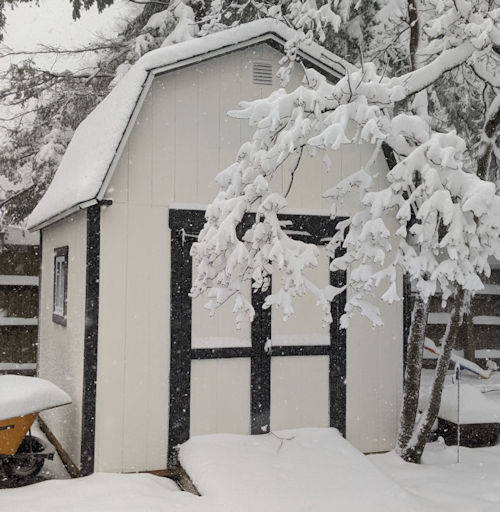 Brrrrrrrr Makes Me Cold Just Looking At This!
Brrrrrrrr Makes Me Cold Just Looking At This!Electric radiators
Electric radiators are another option for small sheds. They are more expensive than fan heaters but are generally more effective at heating larger spaces. They work by heating up oil or water inside the radiator and distributing the heat throughout the space.
Halogen heaters
Halogen heaters are a type of infrared heater that uses halogen bulbs to produce heat. They are effective at heating small spaces and are relatively inexpensive. However, they may not be the best option for larger sheds.
Comparing electric heaters - which is best for your shed?
Electric heaters are a popular option for sheds of all sizes because they are affordable, easy to use, and require very little maintenance. There are a few different types of electric heaters to choose from, including convection heaters, radiant heaters, and panel heaters.
Convection heaters - Convection heaters work by heating up the air in a room and circulating it throughout the space. They are effective at heating larger spaces and are relatively inexpensive. However, they can take some time to heat up and may not be the best option if you need to heat your shed quickly.
Radiant heaters - Radiant heaters work by heating up objects in a room, rather than the air. They are effective at heating small spaces and are generally more efficient than convection heaters. However, they can be more expensive.
Panel heaters - Panel heaters are a type of convection heater that are designed to be mounted on a wall. They are effective at heating larger spaces and are relatively inexpensive. However, they can be less efficient than other types of heaters and may not be the best option for those who want to save money on heating costs.
Wood stoves for larger sheds - benefits and drawbacks
If you have a larger shed or workspace, you may want to consider a wood stove as your heating option. Wood stoves are a popular choice for those who want an efficient and eco-friendly way to heat their space.
Benefits and drawbacks of wood stoves
Benefits - One of the main benefits of wood stoves is that they are very efficient at heating large spaces. They can produce a lot of heat with very little fuel, making them a great option for those who want to save money on heating costs. Additionally, wood stoves are an eco-friendly option because they use renewable resources.
Drawbacks - One of the main drawbacks of wood stoves is that they require a bit more effort to use than other types of heaters. You'll need to gather wood and keep the fire going, which can be time-consuming. Additionally, wood stoves can produce more smoke than other types of heaters, which can be a concern for those who are concerned about air quality.
One of my favorites shown on amazon is the wood stove to the right.
- It's portable
- It's durable
- Use it to heat with
- Use it to cook with
- The price is very reasonable
Kerosene heaters - Not recommended!!
Of all the information I am providing on how to heat a shed - I do not recommend kerosene heaters. They can be dangerous if not used properly. They can produce carbon monoxide and other harmful gases if they are not vented properly.
Solar panels and solar heaters for eco-friendly heating
If you're looking for an eco-friendly heating option on how to heat your shed, you may want to consider solar panels or solar heaters. Solar panels can be used to power electric heaters, while solar heaters use the power of the sun to produce heat. Plus you'll save money on your energy bills!
Benefits and drawbacks of solar heating for your shed
Benefits of solar heating - One of the main benefits of solar heating options is that they are eco-friendly and use renewable resources. They can also be a great way to save money on energy costs over time. Additionally, solar heating options require very little maintenance and can last for many years.
Drawbacks of solar heating - One of the main drawbacks of solar heating options is that they can be expensive to install. Additionally, they may not be the best option for those who live in areas with limited sunlight.
Solar powered generators
Using a solar powered generator is an excellent way to get electricity to your shed. Although these are not very cheap, they may pay for themselves in the long run as you are not using electric from your house to power up your shed.
Ductless systems and heat pumps - a long-term investment
If you're looking for a long-term heating solution for your shed, you may want to consider a ductless system or heat pump. Ductless systems and heat pumps are designed to be a permanent solution for heating and cooling your space.
Benefits and drawbacks of ductless systems and heat pumps
Benefits - One of the main benefits of ductless systems and heat pumps is that they are very efficient and can save you money on energy costs over time. They are also very easy to use and require very little maintenance. Additionally, ductless systems and heat pumps can be a great way to improve the air quality in your shed.
Drawbacks - One of the main drawbacks of ductless systems and heat pumps is that they can be expensive to install. Additionally, they may not be the best option for those who only use their shed occasionally.
Other heating methods - halogen heaters, infrared heat bulbs, and more
In addition to the heating options we've already discussed, there are a few other options to consider. Halogen heaters, infrared heat bulbs, and propane heaters are all popular options for sheds of all sizes
Halogen heaters - Halogen heaters are a type of infrared heater that uses halogen bulbs to produce heat. They are effective at heating small spaces and are relatively inexpensive. However, they may not be the best option for larger sheds.
Infrared heat bulbs - Infrared heat bulbs are another type of infrared heater that can be used to heat small spaces. They work by emitting infrared radiation, which heats up objects in the room.
Propane heaters - A portable propane heater is an option for those who need to move their heater from one location to another. They are easy to use and relatively inexpensive, but they do require fuel.
Power sources for heating your shed - extension cords, solar power, and more
When it comes to powering your shed's heating system, there are a few different options to consider.
Extension cords are a popular choice for those who don't have access to a power source in their shed.
Solar power can be used to power electric heaters and other types of heating systems. Propane heaters require propane fuel.
Tips for maintaining your shed's heating system
No matter what type of heating system you choose for your shed, it's important to keep it well-maintained to ensure that it operates efficiently. Here are a few tips for maintaining your shed's heating system:
- Clean your heater regularly to remove any dust or debris that can accumulate on the heating element. Check your heater's filters regularly and replace them as needed to ensure that the air flow is not obstructed. Inspect your heater's cords and plugs regularly to ensure that they are not damaged or frayed. Keep your heater's fuel supply (if applicable) in a safe and dry location.
Conclusion - choosing the best heating option for your shed
When it comes to heating your shed, there are many different options to consider. The best option for your shed will depend on a variety of factors, including the size of your space, your budget, and your power source. Whether you choose a space heater, a wood stove, or a ductless system, it's important to choose a heating option that is safe, efficient, and effective at keeping your shed warm during the winter months.Rate this article
Monthly DIY
Shed-in-sight
Newsletter
Subscribing will get you discounts on shed plans, monthly updates, new shed design ideas, tips, exclusive discounts on shed building resources and tools. Learn more here.
Recent Articles
-
Does Your Shed Need Shed Floor Skids?
Feb 12, 25 05:53 AM
Shed floor skids will help support your shed floor. They will also allow you to anchor your shed floor to the ground using concrete piers. See how here. -
Gusset fasteners
Feb 06, 25 06:31 AM
For fastening gussets to shed trusses, is it best to use nails or bolts? -
Easy Diy Shed Plans and Ideas For You To Build Sheds
Dec 31, 24 09:49 PM
All types of shed plans for gable, barn, saltbox, and lean to style sheds small and large that can be used for storage, shed to house, workshops and more.
My You Tube Videos









